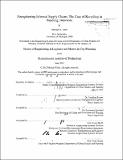Strengthening informal supply chains : the case of recycling in Bandung, Indonesia
Author(s)
Tuori, Michael A. (Michael Aaron)
DownloadFull printable version (8.680Mb)
Other Contributors
Massachusetts Institute of Technology. Department of Urban Studies and Planning.
Advisor
Jonathan Byrnes and Lawrence Susskind.
Terms of use
Metadata
Show full item recordAbstract
A large degree of economic activity in developing countries operates unregulated and unreported in what has become known as the informal economy. Within the informal economy, a large number of individuals work in waste picking and recycling. In Indonesia, up to 70% of all employment is within the informal economy. In Bandung, the nation's third largest city, there are estimated to be more than 3000 individuals working in the informal recycling sector as waste pickers and middlemen. The informal recycling supply chain begins with waste pickers that collect waste materials from homes, businesses, streets, waste transfer sites, and landfills. These materials are then sold through a series of middlemen before reaching the factories that reuse them as inputs to production. Traditionally, academics, policy makers, and advocacy groups have focused their attention on waste pickers, while dismissing recycling middlemen as being exploitative. However, in the case of Bandung, the middlemen industry has a great deal of heterogeneity in terms of earnings and vulnerability. Middlemen also add value to supply chain by providing needed capital and transportation. Using the case of recycling in Bandung, this thesis argues in favor of policies that take into consideration all actors within an informal supply chain. In order to design effective policies, policy makers should have a clear understanding of the supply chain dynamics as well as the roles that each actor in the system serves. This thesis purposes an evaluation tool to aid policy makers in assessing informal supply chains on aspects of both efficiency and social conditions. The application of this tool is then demonstrated in the design of several policy recommendations for enhancing informal recycling activities in Bandung.
Description
Thesis (M. Eng. in Logistics)--Massachusetts Institute of Technology, Engineering Systems Division; and, (M.C.P.)--Massachusetts Institute of Technology, Dept. of Urban Studies and Planning, 2012. Cataloged from PDF version of thesis. Includes bibliographical references (p. 114-118).
Date issued
2012Department
Massachusetts Institute of Technology. Department of Urban Studies and Planning; Massachusetts Institute of Technology. Engineering Systems DivisionPublisher
Massachusetts Institute of Technology
Keywords
Engineering Systems Division., Urban Studies and Planning.